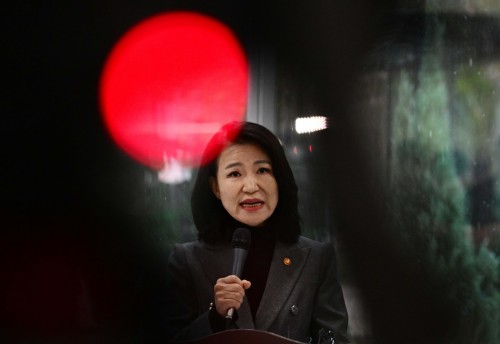 |
| Lee Jin-sook, chair of the Korea Communications Commission, speaks at a press briefing at the National Assembly press room on September 28 after the passage of the bill to create the Broadcasting, Media and Telecommunications Commission. / Source: Byunghwa Lee |
The Korea Communications Commission (KCC) will be abolished 17 years after its launch and replaced by the Broadcasting, Media and Telecommunications Commission (BMTC). Critics called the move a stopgap that changes the signboard without fixing structural problems. KCC Chair Lee Jin-sook, who will be dismissed under the reorganization, decried it as “targeted legislation.”
The National Assembly passed the Act on the Establishment and Operation of the Broadcasting, Media and Telecommunications Commission on September 27. Once the bill is promulgated at the Cabinet meeting on September 30, the KCC will be formally dissolved and the BMTC—whose remit adds pay-TV policy to the KCC’s functions—will begin the launch process. Lee, whose term was set to run through August next year, will be automatically removed.
Created in 2008 to bolster the public interest and independence of broadcasting, the KCC was designed as a bipartisan body with five standing commissioners—two allotted to the opposition—and three-year terms. Under the Yoon Suk Yeol administration, however, the commission became mired in partisan warfare. The president declined to appoint opposition-recommended nominees; the opposition stopped putting forward candidates; and when new chairs such as Lee Dong-kwan and Kim Hong-il were appointed, the opposition sought their impeachment, prompting their resignations.
After spiraling dysfunction, the KCC has operated with just two commissioners since July last year—short of the three needed for a quorum—effectively paralyzing the agency. Arguing that no single party should be able to seize control, the government proposed a seven-member BMTC composed of three standing and four non-standing commissioners to “strengthen public-interest governance.”
But the plan leaves the balance of powers and structural safeguards vague. Without mechanisms to ensure bipartisan agreement, critics warn the new body could face the same cycle of appointment deadlocks, quorum failures, and operational paralysis. Political neutrality is likely to be BMTC’s most pressing challenge. An opposition lawmaker said, “This is like junking a broken car instead of repairing it. Abolishing the commission without removing avenues for political interference just shifts responsibility.”
The transition terms fueled accusations of “targeted legislation” after employees are transferred to the BMTC “excluding political appointees.” The only political appointee at the KCC is Chair Lee. At a press conference on September 28, Lee argued, “They erased the KCC by inserting one word—‘media’—between broadcasting and communications. The frameworks of the KCC and BMTC are largely the same. There is no explanation for why political appointees must be dismissed. It is targeted legislation and a ‘Swiss-cheese law’ full of holes.”
Experts also criticized the overhaul as a cosmetic rebrand that ignores internal remediation. “Rather than enhancing expertise and independence to fit today’s converged media environment, a mere name change delivers little,” a broadcasting-telecom specialist said. “Reforming an independent regulator requires social consensus and open deliberation—not a rushed push. It must be careful and transparent.”
Most Read
-
1
-
2
-
3
-
4
-
5
-
6
-
7





















